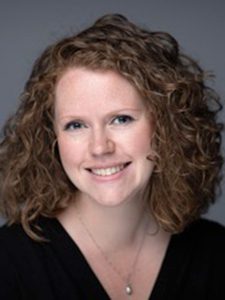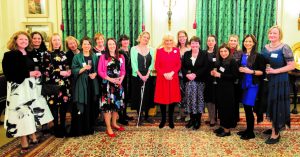Previous Spotlights: Clair Blacketer • Kristin Kostka • Anthony Sena • Kees van Bochove • Mui Van Zandt
 Jenny Lane studied medicine at Exeter College, University of Oxford, where she was awarded Scholar status. She undertook basic surgical training in London, during which she graduated with distinction from a Masters in Surgical Education, Imperial College London. She returned to Oxford as NIHR Academic Clinical Fellow in Trauma and Orthopaedic Surgery in 2014; in 2017, she was awarded Versus Arthritis Clinical Research and MRC Doctoral Training Fellowships to undertake DPhil study in NDORMS, University of Oxford. She currently works with Professors Dominic Furniss, Jane Green and Dani Prieto-Alhambra exploring the ‘Epidemiology of Common Hand Conditions.’
Jenny Lane studied medicine at Exeter College, University of Oxford, where she was awarded Scholar status. She undertook basic surgical training in London, during which she graduated with distinction from a Masters in Surgical Education, Imperial College London. She returned to Oxford as NIHR Academic Clinical Fellow in Trauma and Orthopaedic Surgery in 2014; in 2017, she was awarded Versus Arthritis Clinical Research and MRC Doctoral Training Fellowships to undertake DPhil study in NDORMS, University of Oxford. She currently works with Professors Dominic Furniss, Jane Green and Dani Prieto-Alhambra exploring the ‘Epidemiology of Common Hand Conditions.’
Jenny’s introduction to OHDSI took place in the Barcelona study-a-thon on rheumatoid arthritis, and she is enthusiastic about comparing UK data with other countries, in order to explore differences in surgeon, hospital and healthcare factors that may impact outcomes from surgery. She was the co-lead author of the first published OHDSI paper to come from the COVID19 study-a-thon, entitled “Risk of hydroxychloroquine alone and in combination with azithromycin in the treatment of rheumatoid arthritis: a multinational, retrospective study,” which was published in The Lancet Rheumatology. She earned a 2020 Titan Award for Clinical Application, and she reflects on her journey to OHDSI and all that took place in 2020 in the latest edition of the OHDSI Collaborator Spotlight.
You dove into the community last year. How did you learn about OHDSI, and what interested you to collaborate within the community?
I did indeed! 2020 was the year of OHDSI for me. I heard about OHDSI from my PhD supervisor, Professor Dani Prieto-Alhambra. I’ve always been fascinated by the idea of replicating observational studies internationally, and the more I heard about the open nature of OHDSI, the more I wanted to be involved. I thoroughly enjoy the way the community deals with issues head on and tirelessly aims to drive forward change. In a year where there was so much uncertainty, I really enjoyed being part of such a dynamic and diverse group of individuals who offer their skills with the aim of improving science.
You were part of the Barcelona Study-A-Thon on Rheumatoid Arthritis in January. What memories stick about the process that weekend, and (besides the evidence) what did you learn from that week?
Thinking that we all met in person in January 2020 now feels like a very long time ago! In surgery, there is a saying of ‘see one, do one, teach one’ relating to the old way of learning procedures. The Barcelona Study-A-Thon for me was the opportunity for me to be fully immersed in seeing a study take shape, and see the steps explained in the Book of OHDSI in real time. It was an intense week where I learnt about how to produce a thorough research protocol to publish prior to any results, about Atlas, and about how to make your study more suitable across a whole federation of datasets. As someone who is interested mostly in population level estimation studies, I also learned little about the characterisation and PLP studies that were happening concurrently. (Of course, I also loved meeting the community in person for the first time, and we had some great opportunities to meet properly over some great food as well!)

Jenny Lane (far left) joined research peers within the funding charity Versus Arthritis to Clarence House in early 2020 to meet the Duchess of Cornwall.
You led one of the most impactful studies during the COVID Study-a-thon with your work on hydroxychloroquine. Can you share a bit about why hydroxychloroquine has been an especially important study focus, and what it was like to study a drug that became such a media firestorm in 2020?
As an academic clinician, the noise in my head generated by the COVID pandemic was too great to just concentrate on my normal research area. I felt a duty to use my skills to help develop evidence rapidly alongside returning to full clinical duties to assist in the pandemic response in the UK. It provided solace for me as I worked clinically to know that we were generating more knowledge about potential drug targets. Hydroxychloroquine was the obvious drug target for me to focus on having a background in orthopaedics, as well as spending time focussing on it during the Barcelona study-a-thon, and the personal connection that my mom takes it for rheumatoid arthritis. Leading that project alongside the brilliant Jamie Weaver was just the most insane experience. I have vivid memories of the morning we unblinded the results for cardiovascular mortality after checking diagnostics, and after this knew we had to get the results out as soon as possible. Submitting a completed paper two days after the Study-a-thon finished was incredibly satisfying, and is a credit to the global team involved. The attention from the FDA and EMA following the submission to MedRxiv enabled us to watch our work changing practice in real time. It also led us to undertake a second study into the potential psychiatric side effects of hydroxychloroquine in response to reports of adverse events (that was published on Christmas day!). Jamie and I led a community call recently that was very cathartic looking back on the response we got to the original HCQ article. I certainly feel I learned a lot about scientific integrity, peer review and open science through this experience.
Editor’s note: Jenny discussed these studies earlier in the year during the first episode of the OHDSI podcast, which you can listen to below.
Besides the important real-world evidence you generated around HcQ, your study was specifically cited by the EMA in its most recent Guide on Methodological Standards in Pharmacoepidemiology. How important are the notions of transparency and collaboration in generating robust, reproducible studies, and how much pride did you take in that citation?
Seeing that citation was a great moment. Being part of OHDSI has changed my ideas of how research should be designed, undertaken and reported. I feel that these notions are vital for science to move forward. I feel that this year has definitely changed the way I feel about open science, and that transparency and collaboration are key to the future of epidemiological research during the time of ‘fake news.’
You earned a 2020 Titan Award for Clinical Application at the 2020 OHDSI Global Symposium. How has being so involved with this community impact you as a researcher this year, and what did that award mean to you (personally and/or professionally)?
I still don’t quite believe it! It was a huge honour, and I feel indebted to the whole team, but especially Jamie Weaver, Patrick Ryan, Dani Prieto-Alhambra, and Kristin Kostka alongside those within the core COVID team. It represents a gear shift change in the way I’ve undertaken research both in terms of time, scale and volume that I hope to take forward into the rest of my career. There is an infectious enthusiasm that OHDSI produces that I hope to show others in my future work.
Can you discuss upcoming work, including any opportunities for collaboration from other OHDSI community members?
Now that I’ve stepped back from COVID research, I have returned to my happy place of Trauma and Orthopaedic surgery. I’m leading an OHDSI study into the risk of developing musculoskeletal side effects following hormonal treatments for breast cancer in post-menopausal women with Ed Burn, Kristin Kostka, Talita Duarte-Salles and Dani Prieto-Alhambra. This is hot off the press having been released on the EU PAS register at the end of 2020, and is now inviting collaborators to join. You can read about it here https://github.com/ohdsi-studies/MusculoskeletalAEsAfterAIs and watch cohort diagnostics taking shape. I’d love to hear from anyone who thinks that their dataset may be able to contribute, and we hope that cohort diagnostics will be shaped with these datasets in mind so that the PLE will run in early 2021.
What are some of your hobbies, and what is one interesting thing that most community members might not know about you?
Apart from being the chief of staff to a toddler, my pre-pandemic geek hobby was campanology. Much like Quasimodo, I used to be found in cathedrals in central London and Oxford when I wasn’t in the operating room at work. It has given me a crazy family that reaches from Wall Street in New York to Perth in Australia, and whilst the bells were silent in 2020, I hope we will be able to ring again in 2021 should vaccination go well …
